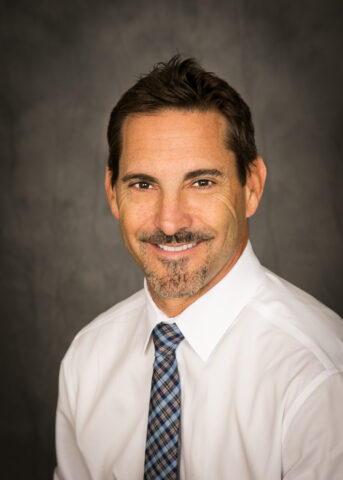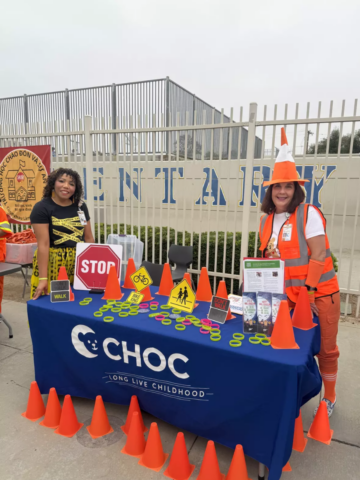Children’s Hospital of Orange County (CHOC) has been selected as the pediatric site in a new statewide effort led by UC Irvine to accelerate the development of promising stem cell and gene therapies and expand patient access to them through clinical trials.
The designation bolsters CHOC’s growing stature as an international destination for children affected with rare and deadly conditions with little but hope for breakthrough treatments, says Dr. Raymond Wang, a metabolic disorders specialist and director of CHOC’s Foundation of Caring Lysosomal Storage Disorder Program.
“It’s a big deal – a huge deal,” Dr. Wang says of the five-year, $8-million grant from the California Institute for Regenerative Medicine (CIRM) announced Oct. 27, 2022.
The grant designates UCI as one of CIRM’s Alpha Clinics.
The UCI Alpha Clinic, led by Dr. Daniela Bota, vice dean for clinical research at the UCI School of Medicine, will lead cell and gene therapy efforts in close collaboration with CHOC and three other healthcare partners: the Tibor Rubin VA Medical Center in Long Beach and community hospitals in Riverside and San Bernardino counties.
“This will accelerate stem cell and gene therapy studies and solidify CHOC as a center for patients throughout Southern California, the state, and beyond who need cell and gene therapy treatments,” says Dr. Wang, who will be the Alpha Clinic director at CHOC when the program officially begins in 2023.
“If patients and their families are looking for a cell or gene therapy clinical trial, we will endeavor to make that trial a reality here at CHOC.”
An enterprise-wide initiative
Gene replacement therapy came into its own around 2015-16, and CHOC has been involved in cutting-edge research that has attracted patients with metabolic disorders from around the world.
The Alpha Clinic designation will broaden CHOC’s work in this area to include all medical disciplines here, including oncology, hematology, neurology and more.
“My job, as well as the job of our awesome clinical research coordinators, will be to equip these different divisions with the knowledge to conduct a well-run cell or gene therapy clinical trial,” Dr. Wang explains.
A key goal of the Alpha Clinic program is to address health disparities and patient equity by reaching some of the most medically underserved patients in the state through a so-called UCI REAL micro network that includes CHOC and its healthcare partners in the three other surrounding counties.
“This novel UCI REAL micro network will create practical knowledge to share throughout the CIRM Alpha Clinics Network, as well as provide direct access to a wide array of clinical programs and engage in meaningful national collaborations,” says Sean Turbeville, Ph.D., CIRM’s vice president of medical affairs and policy.
“This hub-and-spoke model, built on established partnerships, increases the statewide Alpha Clinics Network’s accessibility to diverse populations, encourages active community participation, provides opportunities to enhance workforce development and to train the next generation of stem cell and gene therapy clinical researchers,” Turbeville adds.
Increasing access
Dr. Bota says the Alpha Clinic collaboration will “increase access for our patients and empower us to lead the way in bringing novel regenerative treatments into the Alpha Clinics Network.”
Aileen Anderson, Ph.D., director of the UCI stem cell center and professor of physical medicine & rehabilitation at the UCI School of Medicine, adds: “The UCI Alpha Clinic, together with our partners, will serve as a conduit, translating discovery into clinical research. Over the last three years, the UCI Sue & Bill Gross Stem Cell Research Center has made extensive infrastructure investments, including two new research clinics, a production facility to manufacture FDA-compliant cell and gene therapies and a cell processing laboratory.
“Together, our micro network model and expanded infrastructure, including the new UCI Health – Irvine medical complex under construction in Irvine, will provide value to the CIRM Alpha Clinics Network and the regenerative medicine ecosystem in California and beyond.”
Dr. Wang is hopeful that the Alpha Clinic program will yield new therapies for some of the sickest pediatric patients by giving them access to clinical trials approved by the U.S. Food and Drug Administration.
“It’s very difficult to have to sit down and tell a family, ‘There’s nothing we can do’ or, ‘In order to treat your child, he or she has to undergo a drastic, risky procedure because that is the only therapy available to treat their condition.’
“Hopefully, this effort will result in many more patients having access to cutting-edge clinical trials,” Dr. Wang adds. “And we want to try to bring as many of those clinical trials to CHOC as possible.”
For more information from CIRM, visit Alpha Stem Cell Clinics | California’s Stem Cell Agency




